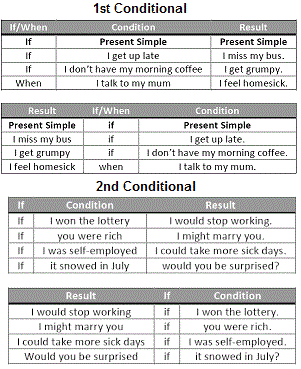Conditional Tenses

Conditional tenses describe the result of something that might happen (in the present or future) or might have happened but didn’t (in the past).

1st Conditional Tenses
IF + SUBJECT + PRESENT SIMPLE, SUBJECT + WILL + INFINITIVE
SUBJECT + WILL + INFINITIVE + IF + SUBJECT + PRESENT SIMPLE
We use the First Conditional to talk about future events that are likely to happen.
- If we take John, he’ll be really pleased.
- If you give me some money, I’ll pay you back tomorrow.
- If they tell us they want it, we’ll have to give it to them.
- If Mary comes, she’ll want to drive.
- If I go to New York again, I’ll buy you a souvenir from the Empire State Building.
- If he’s feeling better, he’ll come.
- If she hasn’t heard the bad news yet, I’ll tell her.
The "future clause" can contain ’going to’ or the future perfect as well as ’will’.
- If I see him, I’m going to tell him exactly how angry I am.
- If we don’t get the contract, we’ll have wasted a lot of time and money.
The "future clause" can also contain other modal verbs such as ’can’ and ’must’.
- If you go to New York, you must have the cheesecake in Lindy’s.
- If he comes, you can get a lift home with him.
2nd Conditional
IF + SUBJECT + PAST SIMPLE, SUBJECT + WOULD+ INFINITIVE
SUBJECT + WOULD + INFINITIVE + IF + SUBJECT + PAST SIMPLE
The Second Conditional is used to talk about ’impossible’ situations.
- If we were in London today, we would be able to go to the concert in Hyde Park.
- If I had millions dollars, I’d give a lot to charity.
- If there were no hungry people in this world, it would be a much better place.
- If everyone had clean water to drink, there would be a lot less disease.
After I / he/ she /it we often use the subjunctive form ’were’ and not ’was’. (Some people think that ’were’ is the only ’correct’ form but other people think ’was’ is equally ’correct’ .)
- If she were happy in her job, she wouldn’t be looking for another one.
- If I lived in Japan, I’d have sushi every day.
- If they were to enter our market, we’d have big problems.
The form ’If I were you’ is often used to give advice.
- If I were you, I’d look for a new place to live.
- If I were you, I’d go back to school and get more qualifications.
The Second Conditional is also used to talk about ’unlikely’ situations.
- If I went to China, I’d visit the Great Wall.
- If I was the President, I’d reduce taxes.
- If you were in my position, you’d understand.
The choice between the first and the second conditional is often a question of the speaker’s attitude rather than of facts. Compare these examples. Otto thinks these things are possible, Peter doesn’t.
- Otto – If I win the lottery, I’ll buy a big house. (1st conditional)
- Peter – If I won the lottery, I’d buy a big house. (2nd conditional)
- Otto – If I get promoted, I’ll throw a big party. (1st conditional)
- Peter – If I got promoted, I’d throw a big party. (2nd conditional)
- Otto – If my team win the Cup, I’ll buy champagne for everybody. (1st conditional)
- Peter – If my team won the Cup, I’d buy champagne for everybody. (2nd conditional)
The ’If clause’ can contain the past simple or the past continuous.
- If I was still working in Brighton, I would commute by train.
- If she were coming, she would be here by now.
- If they were thinking of selling, I would want to buy.
The main clause can contain ’would’ ’could’ or ’might.
- If I had the chance to do it again, I would do it differently.
- If we met up for lunch, we could go to that new restaurant.
- If I spoke to him directly, I might be able to persuade him.
Sometimes the ’if clause’ is implied rather than spoken.
- What would I do without you? ("if you weren’t here")
- Where would I get one at this time of night? ("if I wanted one")
- He wouldn’t agree. ("if I asked him")
1 comentario
Nacho Cuesta -